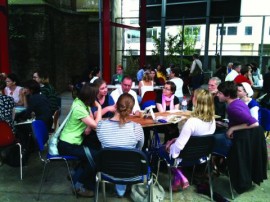
Crossing over
That 63% of those currently on contract to a-n are practitioners demonstrates our commitment to providing income for artists.
That 63% of those currently on contract to a-n are practitioners demonstrates our commitment to providing income for artists.
Cameron’s Big Society has been criticised for being a cover for spending cuts. Its proposal to shift power from central government to communities and volunteers is not enough to maintain services that will be compromised by deep cuts, many argue.
Jack Hutchinson reports for AIR from the second annual State of the Arts Conference, organised by the RSA and Arts Council England.
Resources, workshops and events for artists across the UK.
AIR Activists join art students and other art-activist groups in act of creative resistance at Tate Britain.
Turning Point, a national network of regional visual arts groups, is taking the lead in placing artists at the centre of their activities.
“Things are always changing
So don’t be sad and blue
Change can make you happy
‘Cause it brings you something new”.
(Lyric © Sesame Street)
Turning point, Visual Arts UK, CultureForum, NALGAO – these are just some of the burgeoning peer networks for arts professionals that have been proactive and visible in the arts funding debates.
Alongside AIR’s campaigns and work looking at the issues affecting artists, a group of AIR activists (myself included) have volunteered to play a more active role; raising awareness of the value of artists. These are early days in what will hopefully prove to be long-term and ever-widening effort, but conversation has begun and some activists already have events planned.
On Wednesday 6 October AIR: Artists Interaction and Representation launched its programme to develop a modern, inclusive infrastructure for artists’ representation. The event took place at DACS (Design & Artists Copyright Society), 33 Great Sutton Street, London. AIR has attracted over 15,000 members since […]
Active members from AIR recruited to proactively contribute to raising the profile and widening recognition of the value of artists.
AIR members discuss what representation will look and feel like for artists, plus Architecture for representation outlined.
Extended text version.
A programme of research into the lifestyle and artistic needs of senior artists in Canada with reference to international case-studies will inform developments by AIR – Artists Interaction and Representation.
In the face of a new political era compounded by an unprecedented financial climate, the need to forecast our future living and working conditions is urgently felt.
Sarah Burgess, David Cotterrell, Peter Hill and David Watson were amongst 186 AIR members who successfully claimed Payback in 2009, the first year that AIR has been a recognised collection agency for this scheme run by DACS – Design and Artists Copyright Society.
AIR – Artists Interaction and Representation will later this year be providing a much-needed platform for artists to identify and lead campaigns to improve their professional status and economic conditions, supported by a secondment to AIR from Canadian Artists Representation.
Response from AIR: Artists Interaction and Representation.
Launched in 2006,Turning Point is a national ten-year strategy for the visual arts. A network of regional Turning Point groups has since been emerging, each charged with “strengthening the visual arts infrastructure”.
Cultural Leadership Programme’s Meeting the Challenge initiative, set up to support and nurture current and future leaders, offered an open submission inviting organisations to apply.
Arts Council England has embarked on an extensive exercise to consult stakeholders including artists on their policies and priorities for the future.
January’s AIR Advisory Group meeting held in Newcastle provided the opportunity to invite Scottish Artists Union President Chris Biddlecombe to come along.
The State of the Arts conference organised by Arts Council England and RSA (Royal Society for the encouragement of Arts, Manufactures and Commerce) and held in January in London was heralded as a key opportunity to examine the current and future challenges and opportunities around domestic arts policy, strategy and funding and Britain’s position within the global cultural landscape.
Last year’s National Endowment study revealed the importance of artists in America’s cultural vitality and economic prosperity.
In November, the Federation of International Musicians and International Federation of Actors launched their Manifesto on the Status of the Artist as a major step in highlighting the conditions for a contemporary practice. Although aimed at performing artists and emanating from Estonia, the principles and intentions of the Manifesto are highly pertinent to visual and applied artists and to the UK.
Over 50 individuals from 18 different European countries attended ECA conference Experiencing the Arts – Artists’ Contribution to Creative Thinking and European Innovation, held in Valetta Malta 30 October – 1 November.








